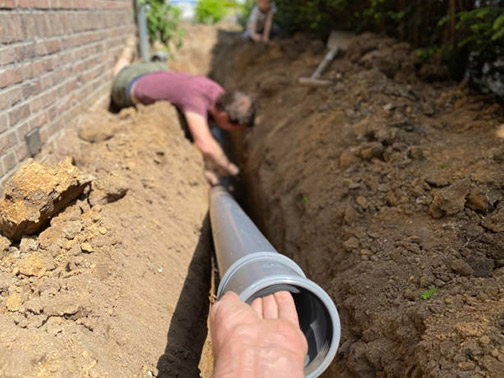
Whether due to aging, corrosion, ground movement, tree root invasion, clogs, or blockages, your sewer line will malfunction at some point in its lifetime. Most times, these will be minor to moderate issues that will not cost you a ton of money to fix.
However, the time eventually comes when these problems force you to think of replacing the sewer line instead of repairing it. When this happens, Jambi Property Management notes that the worst thing you can do is try to fix a sewer line that should be replaced or replace a sewer line when it can be repaired.
If a sewer line can be repaired, replacing it is a waste of money. Sewer line replacement in Chicago is costly; therefore, it should be delayed for as long as possible. On the other hand, you also waste money if you fix a sewer line that should be replaced, since you will ultimately have to replace it.
Is there a way to know when to repair a sewer line versus replace it? This short guide will answer that question.
Signs that your sewer line needs attention
If you experience the following problems in your home, you may need sewer line repair or replacement:
- Frequent drain clogs
If more than one drain in your home is slow or clogged and the issue keeps recurring, your sewer line requires attention.
- Ground movement
If your home has experienced changes in the structure of the ground due to house settling, erosion, earthquakes, or sinkholes, your sewer line needs attention.
- Tree root invasion
If there are trees or shrubs with invasive root systems near your sewer line, and you have had past problems with tree roots invading the sewer line.
- Sewage odors
If you are dealing with the smell of raw sewage in your home, your sewer line may be cracked or blocked and requires urgent attention.
- Lush patches of grass
Patches of extra-green grass in your lawn or damp areas in your yard are signs of a leaky sewer line that needs immediate attention.
- Pest invasion of your home
If roaches, rats, mosquitoes, etc., are invading your home, a broken sewer line may be spilling raw sewage and attracting these pests.
Should you repair or replace your sewer line to fix these problems?
When to repair your sewer line
You should repair the sewer line if:
- The line is structurally sound
Even if there are problems in the sewer line, if the pipes are not brittle, misaligned, or disintegrating, there is no need to replace the line.
- There are isolated problems
The blockage or damage is isolated to a section of the line. The blocked or broken section can be cleared using hydro jetting or with targeted repairs.
- There are minor cracks in the line
These can be fixed using trenchless pipe repair methods, such as epoxy lining, instead of digging up the entire pipe to replace it.
- Tree roots have invaded the line
If tree roots have not taken over the entire line, and the pipes can still be cleared by jetting them, there is no need to replace the sewer line.
- The timing is wrong
If the right option is to replace the line, but this is not immediately possible for financial reasons, it makes sense to repair the line as a short-term solution.
When to replace your sewer line
You should replace the sewer line if:
- The pipes are outdated
If your sewer line is made of materials like clay, cast iron, galvanized steel, or Orangeburg, it will be prone to corrosion, cracks, and collapse. You should replace the entire line.
- There is widespread damage
If there are cracked or corroded sections across the entire length of the sewer line, fixing one part will not solve the problems. It is better to replace the entire sewer line.
- There are frequent sewer backups
A sewer line that backs up frequently, even after being cleaned and repaired, is probably failing. The line should be replaced, or it can cause major damage to your building.
- There are collapsed pipe sections
You really can’t repair a sewer line that has bellied or collapsed sections. The only real solution is to replace the damaged section or the entire line.
- Extensive tree root invasion
If tree roots have taken over vast sections of the sewer line, resulting in significant damage to the pipes, the entire sewer line should be replaced.
- It is out of compliance
If the sewer line does not meet local plumbing codes, repairing it will not solve this problem. The only acceptable option is full sewer line replacement.
Finally, how do you determine the extent of damage to your sewer line in order to decide on the right solution? You should conduct a sewer camera inspection.
Sewer camera inspections don’t take long. They are non-invasive (don’t involve digging), yet they are the most effective method for evaluating the condition of a sewer line.
Based on the sewer camera inspection report, you can work with your Chicago plumber to decide on the best method to solve the problems in your sewer line.

